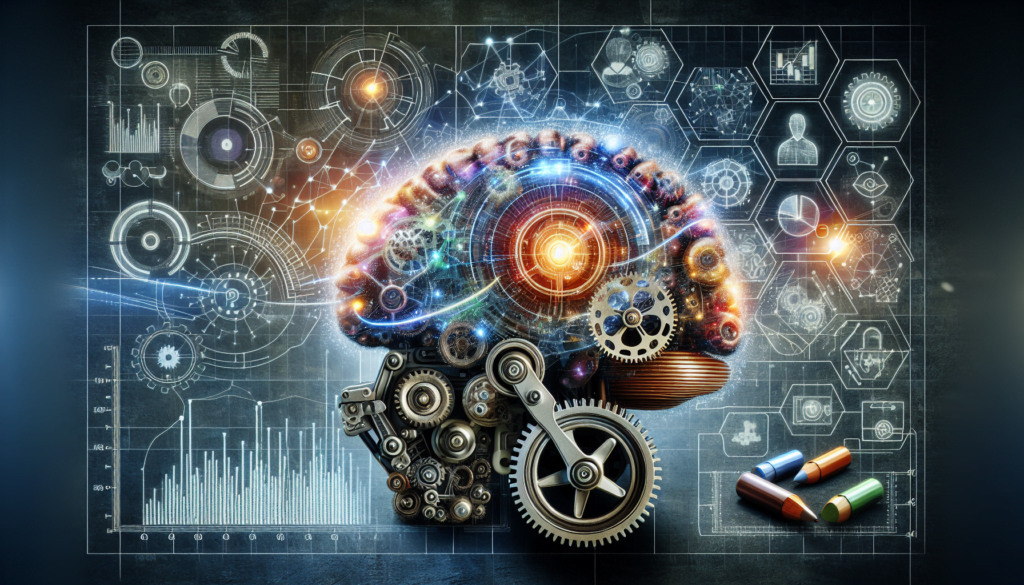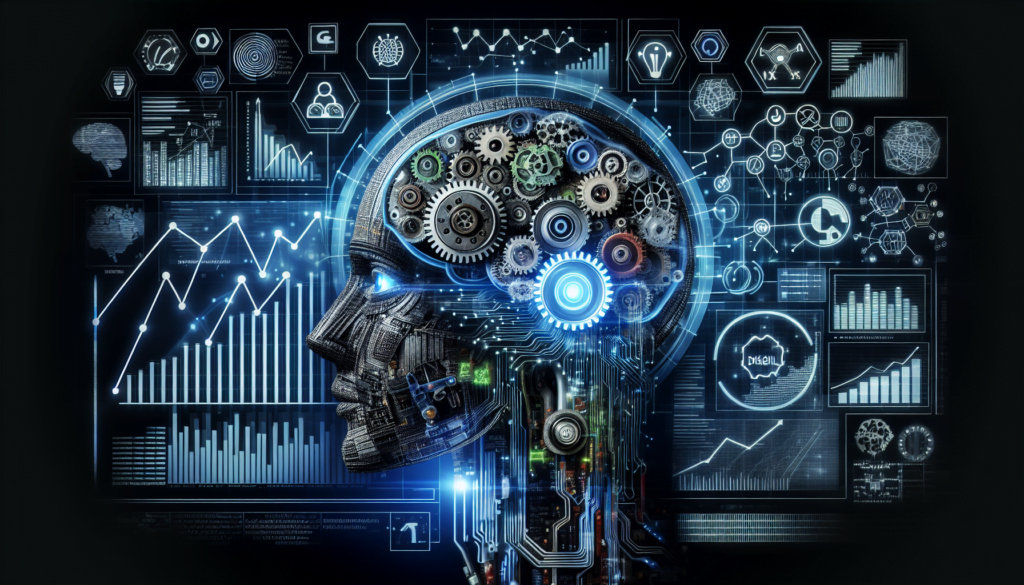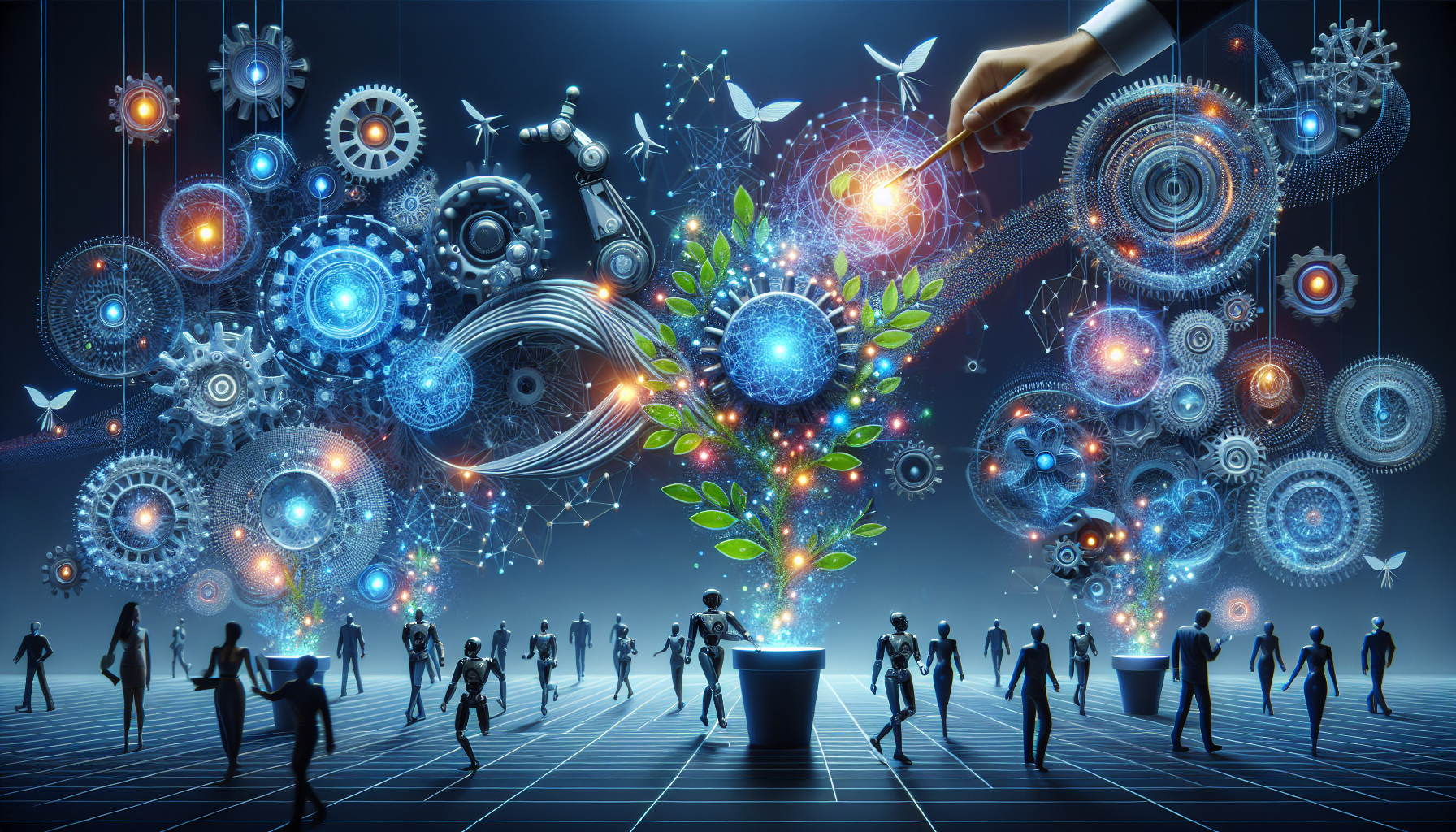Leveraging AI for Innovative Marketing Strategies
Imagine your marketing strategies evolving with AI’s cutting-edge capabilities—transforming customer experiences, personalizing campaigns like never before, and analyzing data with unprecedented accuracy. “Leveraging AI for Innovative Marketing Strategies” takes you through the incredibly dynamic realm where artificial intelligence becomes the linchpin of modern marketing mastery. Discover how AI not only sharpens targeting precision but is also fostering creativity, giving you tools to anticipate your customers’ needs and craft messages that truly resonate.

Understanding AI in the Realm of Marketing
In today’s fast-paced world, you’re likely to come across the term “artificial intelligence” quite often. But when it’s applied to marketing, what does it actually mean? That’s what you’ll discover in this comprehensive exploration of AI’s role in the cutting-edge strategies that are transforming the marketing industry.
Defining Artificial Intelligence in the Marketing Context
In the marketing realm, artificial intelligence refers to systems or machines that mimic human intelligence to perform tasks and can iteratively improve themselves based on the information they collect. For you, that means AI can analyze consumer data, spot trends, and use those insights to make strategic decisions that might have been tough or time-consuming to come up with manually. It’s not just about automating repetitive tasks; it’s about understanding and engaging with your customers in a more profound, personalized way.
Brief History of AI in Marketing
Your journey through AI in marketing begins in the past. Initially, marketers used basic automation for tasks such as sending out batch emails or managing campaign schedules. But as technology evolved, it became smarter. The advent of data analytics and machine learning enabled a more nuanced understanding of customer behaviors and preferences, giving rise to a more strategic application of AI in marketing.
Current Landscape of AI Technologies in Marketing
Today, you’ll find AI integrated into nearly every aspect of marketing – from chatbots that provide instant customer service to sophisticated algorithms that can predict future buying patterns. There’s a growing suite of tools designed to enhance customer knowledge, optimize marketing campaigns, and create more dynamic, personalized content and experiences.
Leveraging AI for Innovative Marketing Strategies
AI-Driven Data Analysis for Decision Making
Decision-making in marketing is increasingly powered by data analysis, and AI is the engine behind it. Here’s how it makes sense of the vast amounts of data at your fingertips.
The Role of Big Data in Modern Marketing
In your quest to understand customer desires and industry trends, big data is key. Marketing strategies pivot on analyzing customer data points, and AI thrives on such datasets. It enables you to sift through massive amounts of information quickly and efficiently, turning data into actionable insights.
Predictive Analytics for Consumer Behavior
Knowing what your customer will do next is like having a crystal ball, but in marketing, it’s predictive analytics that gives you this foresight. AI algorithms analyze past consumer behaviors to forecast future actions, empowering you to tailor your marketing strategies proactively.
Real-time Data Processing and Decision Support Systems
In the time it takes you to blink, AI can process and analyze data that informs your marketing decisions. Real-time data processing means you can adapt your approach instantly as conditions change, ensuring your marketing strategies are always one step ahead.
Personalization at Scale with AI
One of AI’s superpowers is offering personalized experiences to countless customers simultaneously. Here’s how it’s done.
Customizing Customer Experiences with AI
AI helps you treat each customer as an individual by crafting tailored experiences based on their interactions, behaviors, and preferences. This level of customization at scale was unheard of before AI became sophisticated enough to handle it.
Dynamic Content Creation and Delivery
The content you encounter no longer follows a one-size-fits-all approach, thanks to AI. Algorithms can now generate and deliver content dynamically, responsive to real-time interactions. This means the content you see is always relevant and engaging.
AI-powered Recommendation Engines
Ever wondered how online platforms seem to know just what you’d like? AI-powered recommendation engines analyze your past behavior to suggest products or content that align with your interests, making for a seamless and personalized online experience.

Chatbots and Virtual Assistants in Customer Service
AI isn’t just transforming marketing; it’s revolutionizing customer service, too. Here’s a look at how.
Enhancing Interaction through Conversational AI
Conversational AI allows for natural, flowing conversations between you and virtual assistants or chatbots. They’re fast becoming the first point of contact, providing instant, 24/7 support and significantly enhancing customer interaction.
Automating Customer Support with Intelligent Agents
Intelligent agents can handle a range of customer support queries without human intervention, freeing up your customer service team to address more complex issues. This not only improves efficiency but also ensures customers get quick resolutions to their problems.
Gathering Insights from Customer Interactions
Every chatbot conversation or virtual assistant interaction is a goldmine of customer insights. AI helps parse these interactions for valuable data, enabling you to refine your customer service approach and better meet customer needs.
AI in Advertising: Programmatic Buying and Targeting
AI’s role in advertising is transformative, introducing methods like programmatic buying and more precise targeting.
Understanding Programmatic Ad Buying Platforms
Programmatic ad buying uses AI to purchase ad inventory in real-time, allowing you to target audiences more accurately and efficiently. It’s like having a digital auction house for advertising space, where the best bids for ad placements are determined in milliseconds.
Optimizing Ad Spend with Precision Targeting
With AI, your advertising budget is used more effectively by targeting users based on their predicted interest in your product or service. This depth of targeting ensures that you are reaching the people most likely to engage, optimizing your ad spend.
Measuring and Analyzing the Impact of AI-based Advertising
Gone are the days of guesswork in advertising. AI-based platforms provide in-depth analytics that allow you to measure the performance of your ads and make data-driven decisions to refine your advertising strategy.
Content Marketing Transformed by AI
AI is a game-changer for content marketing, from creation to optimization. Here’s how you can harness its power.
Automated Content Creation Tools
Imagine having a digital assistant that can draft content for you. Automated content creation tools powered by AI can generate written content, infographics, and even videos, helping you maintain a steady stream of quality content with less effort.
SEO and Content Optimization with AI
Optimizing content for search engines can be a complex task, but AI simplifies it by suggesting keywords, analyzing the competitiveness of content, and more. It’s like having an SEO expert embedded in your content management system.
Tracking Content Performance and Engagement
With AI, you can track how your content performs in real-time and understand how it engages your audience. Insights derived from AI help you tweak your content strategy to ensure maximum impact.
Influencer Marketing Enhanced by Artificial Intelligence
Even the realm of influencer marketing is not untouched by AI. Let’s see how it’s being used to refine strategies in this space.
Identifying Influencers with Data Analytics
Choosing the right influencer for your brand is crucial, and AI makes it easier by analyzing data on influencer performance across various platforms. This helps you identify influencers who are not only popular but also a good fit with your brand values and audience.
Predicting Influencer Campaign Performance
AI algorithms can forecast the potential success of influencer campaigns by examining historical data and current trends. This foresight helps you to be more strategic in your collaborations and campaign investments.
Optimizing Influencer Relationships with AI Insights
AI tools can track and analyze the results of influencer partnerships, providing actionable insights for strengthening these relationships. You can determine what works, what doesn’t, and how to optimize future collaborations for better results.
Optimizing Pricing Strategies with AI
Pricing strategies can make or break your success in e-commerce. Here’s how AI helps navigate this critical element.
Dynamic Pricing Algorithms for E-commerce
Dynamic pricing algorithms adjust prices in real-time based on supply, demand, and competitor pricing. This means you can always offer competitive pricing to your customers and maximize your margins.
Competitor Price Monitoring and Analysis
Keeping an eye on what the competition is doing can be exhaustive, but AI does the heavy lifting for you. It actively monitors and analyzes competitor pricing, helping you stay one step ahead in the pricing game.
Demand Forecasting and Elasticity Modeling
Predicting how demand for your products will change allows you to adjust pricing and stock levels accordingly. AI helps in forecasting demand and understanding price elasticity, ensuring that you are always meeting customer needs profitably.
Content Marketing Transformed by AI: Email Marketing Evolution through AI
Email marketing remains one of the most effective channels, and AI elevates its potential even further.
AI and Email Personalization Techniques
With AI, you can hyper-personalize emails, from the subject line to the content within. This technology allows you to send personalized emails at scale, enhancing engagement and conversion rates.
Optimizing Send Times Using Machine Learning
Sending emails at the right time can significantly impact their effectiveness. Machine learning algorithms analyze when your subscribers are most likely to open and read your emails, helping you time your campaigns for the greatest impact.
Predictive Analytics for Email Campaign Success
By evaluating numerous variables, predictive analytics can guide you on which email campaigns are likely to succeed. This foresight helps in crafting email campaigns with content that resonates and calls to action that convert.
Content Marketing Transformed by AI
The Future of AI in Marketing
As you stand at the cusp of what’s coming next, the role of AI in marketing continues to expand.
Emerging Trends in AI and Marketing
The future promises even more integration of AI in marketing with trends like voice search optimization, visual recognition technology, and AI-generated content becoming the norm. Keeping an eye on these trends will ensure that you’re ready for the next wave of innovation.
The Ethical Considerations of AI in Marketing
As AI becomes more prevalent, ethical considerations come into play. Issues like data privacy, consent, and bias in AI algorithms are just a few points that you’ll need to navigate carefully to maintain trust and integrity in your marketing practices.
Preparing for an AI-Dominated Marketing Landscape
To stay ahead, embracing AI is not just an option; it’s a necessity. It means being open to learning and adapting, investing in the right tools, and building a marketing strategy that is both data-driven and customer-centric. By doing so, you’ll be well-equipped for a marketing future that’s powered by intelligent technology.















